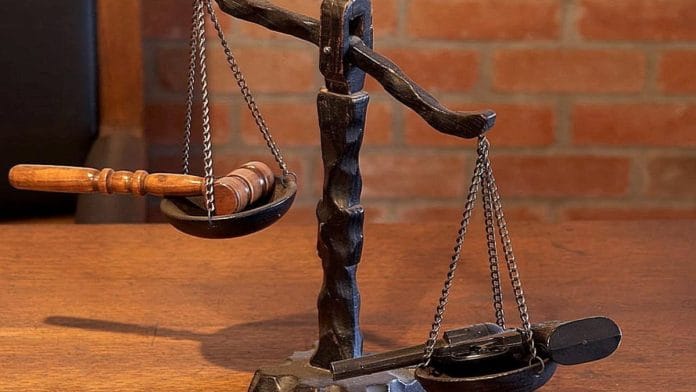Thank you dear subscribers, we are overwhelmed with your response.
Your Turn is a unique section from ThePrint featuring points of view from its subscribers. If you are a subscriber, have a point of view, please send it to us. If not, do subscribe here: https://theprint.in/subscribe/
The Constitution of India provides concept for a single and unified judiciary in India. The task of the judiciary is the authoritative adjudication of controversies over the application of laws. It is concerned primarily with both what the law is and what it ought to be. That includes questions of how persons and social relations are interpreted in legal terms, and of the values in and of law in specific situations. Jurisprudence is the philosophy and theory of law. Work that is counted as jurisprudence is mostly philosophical, but it includes work that also belongs to other disciplines, such as sociology, history, politics and economics. The history of law is in no small part the history of its boundaries. And the history of legal theory, or jurisprudence more narrowly, is thus a history of exploring, analyzing, and debating these boundaries.
Bail is only a temporary release of a prisoner in exchange for security given for the prisoner’s appearance at a later hearing. Interim bail is given for a defined period for specific reasons – e.g. see an ailing parent or attend the wedding of a progeny etc. A bail does not remotely imply acquittal nor is it a pointer in that direction. Bail does not absolve guilt. The reason why prisoners, especially V.I.P. prisoners proclaim innocence on “receipt” of bail, is that their cases are in the courts for decades and dragged on for no apparent valid reasons except to keep the V.I.Ps out of jail.
Every person before the courts rightfully expects a fair trial. The question in this particular instance is whether the case of the defendant can be considered to extend beyond the boundaries of codified law. While it is difficult to say with any authority whether the laws of bias and public perception are in alignment or not, concerns have been raised that the fair-minded observer bears no resemblance to an average member of the public or reasonably reflects general public opinion. Members of the public tend to be more ready to decide a judge may be biased. This gap extends in a number of cases thought to give rise to possible bias, including financial interests and relationships and the risk of prejudgement, as well as precedence on leading cases.
Jurisprudence indicates that law is not simply the sum total of all the rules, principles, procedures, norms, and institutions in the society at large. It follows that there are sources of normative guidance and factual enlightenment that legitimately exist in the wider society but that are nevertheless no part of law. Many of the important debates over the past few years in India appear to be in the realm of jurisprudence especially when they concern new laws to counter monetary delinquency and terrorism. They have been about the boundaries of law, and about the extent to which that some have thought of as a non-law as becoming law, and occasionally about the extent to which that some have thought of as law is not really law at all. Law is a all about its source and understanding its nature accordingly requires understanding which sources constitute the law and which do not. It is only to be expected, therefore, that jurisprudential debates about the nature of law are very often about which sources of decisional guidance are to be treated as law.
The case of Arvind Kejriwal getting bail, is definitely a special case that a serving CM has been taken into custody by law enforcement. The reasons and circumstances of custody are not relevant, to our discussion here to the extent the case well known. It also brought into common parlance the oft-quoted aphorism “Not only must Justice be done; it must also be seen to be done”. In this wake, here is a relevant extract of the judgement granting the CM, bail
Extracts from judgement
“… CBI has filed a chargesheet, followed by two supplementary chargesheets. However, charges have not been framed. At this stage, it is not possible for us to either conclude the arguments or finally pronounce the judgment. However, there is an intervening factor which has prompted us to consider and pass the present order, namely, 18th Lok Sabha General Elections, which are in progress. As the appeal is pending before us, we do not think it would be proper for us to direct the appellant – Arvind Kejriwal to approach the trial court for interim bail/release. This may not be apt in view of the legal issues and contentions that are under examination and consideration before us.”
Tailpiece: This extract amply clarifies that this case has been treated as one outside the boundaries of codified law. Also, Justice is seen to be done – albeit temporarily, as Mr. Arvind Kejriwal is expected to return to custody on June 2. A justified verdict.
(The author is an Indian Army veteran and a contemporary affairs commentator. The views are personal.)
These pieces are being published as they have been received – they have not been edited/fact-checked by ThePrint


